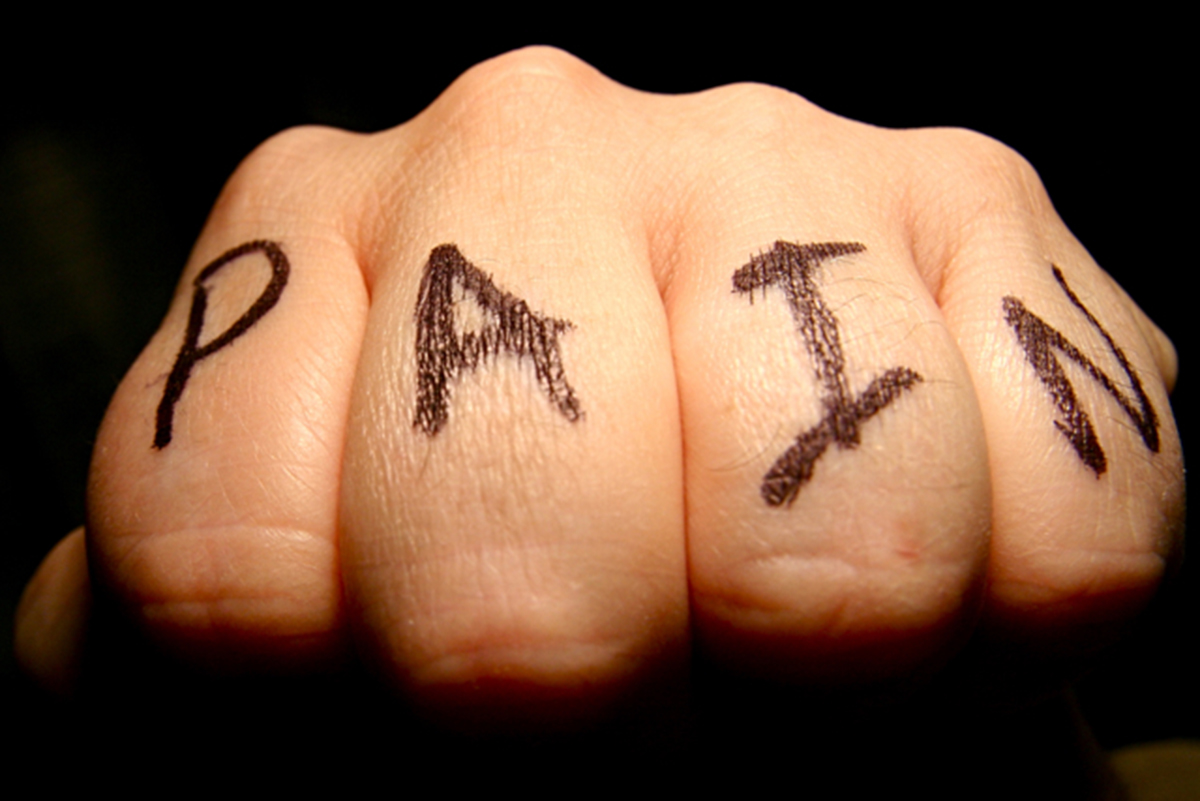Table of Contents
We've all heard the phrase "No pain, no gain". The ability to withstand a few aches and pains without groaning, or running off to your doctor, is seen as an admirable trait.
If you've always been proud of your ability to grit your teeth and bear a few minor discomforts, be aware. Being stoic - giving that strange, new pain "just one more day" - could mean that you overlook certain important pains that should send you straight to your doctor.
Here are seven pains that you should never ignore.

Chest, Shoulder, or Jaw Pain
If you're having a heart attack, you may feel pressure in your chest (like there's a heavy weight - a lump of rocks, a rhino, or your Great Aunt Patty - sat on you). You may also feel pain that may improve when you rest, and is often associated with shortness of breath.
This is an urgent symptom.
However, some people don't have pain in their chest. They have referred pain in their shoulder, their jaw, their arm or even - hardest to spot - in their tooth.
If you have chest pain, or nausea and indigestion that don't improve with antacids, see a doctor immediately. If you can't get an immediate appointment, call an ambulance.
The faster you act, the better your recovery.
"The Worst Headache of Your Life"
If you have never had a headache as bad before - you feel that your skull is splitting apart, your head is pounding so bad you can barely see - and no painkiller in your medical cabinet can even begin to touch it, go straight to the ER/Accident and Emergency Department.
Most likely, you're suffering a migraine, or a sinus headache.
READ Natural Remedies For Cluster Headaches
But, rarely, it could be a cerebral aneurysm or a brain tumour. No matter how many headaches you've had before, whether or not you are a chronic migraineur or have hardly had a single headache, the worst headache of your life always requires further tests.
This is especially true if it:
- Worsens when you stand, bend or cough
- Worsens over time, or
- Comes on suddenly
And comes with symptoms, such as:
- Speech problems or confusion
- Fainting
- Vomiting
- Numbness or weakness.
Remember: these causes are unlikely; there are many causes of very severe headaches. But it's always best to get tested.
Lower Back Pain
Most back pain stems from muscular strain following routine activity. However, severe lower back pain can be a sign of several conditions that require medical treatment.
Kidney or bladder infection: - Look out for burning or pain when you urinate; frequent urination, scanty output, foul-smelling urine, and a low-grade fever. Treatment usually requires antibiotics.
Kidney Stones:- Look for intense pain, occasionally extending to the groin and (in men) the scrotum, nausea, frequent and painful urination, and blood in the urine (haematuria). Treatment can involve anti-emetics and painkillers to enable passing the stone at home, or surgical removal of larger stones in hospital (possibly by breaking up the stone with high-frequency waves).
READ Natural Treatment for Lower Back Pain
Kidney tumour:- Look for blood in the urine (haematuria), persistent pain, and a swelling in the kidney area. You may also notice extreme fatigue and weight loss. Treatment usually involves removal of the tumour and chemotherapy.
Some people, especially those with a family history, have back pain before an aortic dissection. In aortic dissection, the main blood vessel that feeds the lower part of the body bursts. This is a medical emergency. See your doctor if you notice back pain, especially if you have: shortness of breath, a weak pulse in one arm compared to the other, or fainting.
- www.cancerresearchuk.org/about-cancer/type/ovarian-cancer/about/ovarian-cancer-symptoms
- www.cancerresearchuk.org/about-cancer/type/ovarian-cancer/diagnosis/ovarian-cancer-tests
- www.diabetes.org.uk/Guide-to-diabetes/What-is-diabetes/Diabetes-Symptoms/
- www.nhs.uk/Conditions/Appendicitis/Pages/Symptoms.aspx
- www.nhs.uk/Conditions/Cystitis/Pages/Symptoms.aspx
- www.nhs.uk/Conditions/Cancer-of-the-kidney/Pages/Symptoms.aspx
- www.nhs.uk/Conditions/Ectopic-pregnancy/Pages/Symptoms.aspx
- www.nhs.uk/Conditions/Kidney-stones/Pages/Symptoms.aspx
- www.nhs.uk/Conditions/Gallstones/Pages/Symptoms.aspx
- www.nhs.uk/Conditions/Pancreatitis/Pages/Symptoms.aspx
- www.nhs.uk/Conditions/Peptic-ulcer/Pages/Symptoms.aspx
- health.clevelandclinic.org/2015/12/8-aches-pains-shouldnt-ignore/
- www.everydayhealth.com/news/truth-about-traveling-blood-clots/
- www.mayoclinic.org/diseases-conditions/aortic-dissection/basics/symptoms/con-20032930
- www.mayoclinic.org/diseases-conditions/intestinal-obstruction/symptoms-causes/dxc-20168463
- www.webmd.com/heart-disease/features/7-pains-you-shouldnt-ignore#1
- www.webmd.com/women/features/serious-pains#1
- Photo courtesy of cosmic_bandita: www.flickr.com/photos/cosmic_bandita/3699832401/
- Photo courtesy of cosmic_bandita: www.flickr.com/photos/cosmic_bandita/3699832401/
- Photo courtesy of stevendepolo: www.flickr.com/photos/stevendepolo/4129400323/

